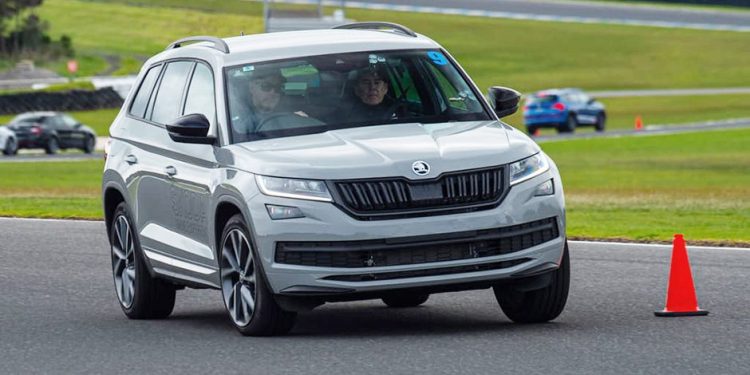Skoda throws weight behind Street Smart driver training
Skoda New Zealand has joined the likes of Hampton Downs Motorsport Park, and the councils of Central Otago and Queenstown as a lead partner for the Street Smart driver training — an initiative formerly connected to Holden.
Kicking off in 2018, Street Smart is a listed charitable trust helmed by programme director Hayden Dickason and road safety expert Peter Shephard. Approximately 1300 people have gone through the programme thus far, with training events held nationwide.
Participants go through an eight-hour, 10-module programme which includes learning about vehicle distraction, and practical learning about attention and accident avoidance. The programme has a number of distinctive qualities, including its consistent nationwide roll-out, its use of race track facilities, and the fact that young participants are welcome to bring their parents along so that they too can learn.

From left to right: Street Smart programme director Hayden Dickason, driver safety advocate Greg Murphy, Skoda NZ GM Rodney Gillard
Speaking to media earlier today, Street Smart ambassador and outspoken driver education advocate Greg Murphy underlined that New Zealand’s current road safety statistics are “really disgusting”, making the Street Smart programme all the more important.
“Thank you to Skoda and Giltrap Group for seeing our vision and believing in what we believe in, and supporting us to spread the message a bit more and make a difference,” said Murphy.
“Our road toll, our road crash statistics in New Zealand are really disgusting. They really are something we have looked at and talked about over many years. And effectively as a country we have done very little to improve the situation.
“Last year, with Covid-19, we still had a road toll that we really should be ashamed of. It was disturbing to still see people being killed on our roads during four weeks of complete lockdown, and I think that says it all. There’s a lot of work to do.”
“It’s not always about selling cars, it’s about giving back to the community,” added Skoda New Zealand general manager Rodney Gillard. “This is quite a serious campaign. We’re not just in it for today, this is a very long-term relationship for us and for the [Giltrap Group].
“On behalf of Skoda network we’re really thrilled to be a part of this. Road safety is very important for Skoda globally, and globally the brand continues to endeavour to provide advanced safety technologies in cars that should both actively prevent accidents and protect occupants in case of an emergency.”
According to Murphy, 2020 saw crash rates and crash fatality rates for those in the 16–24 year-old age bracket increased by 15 per cent, despite a large chunk of the year being spent under some form of Covid-19 lockdown and less cars subsequently being on the road. He noted that little had changed to New Zealand’s licensing system to address the issue.
“We haven’t changed anything in New Zealand when it comes to licensing since 1987 when the graduated licensing system was introduced. The only major thing that’s happened since then was an increase [in age] of getting your license, from 15-years-old to 16-years-old,” Murphy added.
Dickason stressed New Zealand’s situation by comparing us to Norway and Sweden; two countries that have made programmes similar to Street Smart mandatory for all drivers wanting a license.

“You can go out and get a qualified driving instructor or mum and dad, […] but hands-on, practical, learning-by-doing cognitive learning is one of the crucial things we picked up from worldwide research as being best practice in those countries that are recognised for young driver learning, like Norway and Sweden. We adopted a lot of our learnings from there,” he said.
Sweden boasts an annual road toll fatality rate of approximately three deaths per 100,000 people, with New Zealand sporting over double this amount. Dickason noted that the two countries feature similar challenging, winding roads, with Sweden factoring in much more inclement weather patterns.
Dickason notes that 93 per cent of Street Smart participants reported back that the programme had a good or high impact on the way they drive. 81 per cent have not had a crash since taking part, and out of the 19 per cent that did 71 per cent weren’t at fault in their respective accident. 83 per cent of participants went on to recommend the course to others, and 89 per cent said it raised their level of awareness behind the wheel.
Both Murphy and Dickason said that the hope now is that the Street Wise programme could become a mandatory fixture in New Zealand’s licensing structure, with the initiative aiming for full funding from more supporters and at a government level.
“Without the financial support from the likes of Skoda, we just wouldn’t be able to deliver the programme. It’s so heavily externally subsidized. As we move forward our aspiration is that the central government agencies, such as the NZTA, will see the benefit of Street Smart,” said Dickason.
“We are in regular communication with them, but I think everyone would appreciate that from the central government’s point of view that it’s not an instant result. But, if we could work towards something like this being mandatory in every person’s licensing structure, I think we could walk away from this very very proud.”





